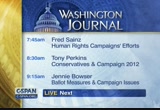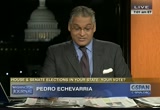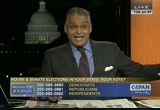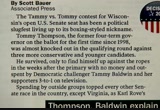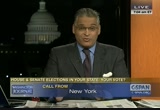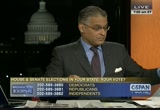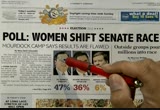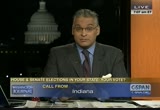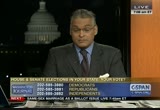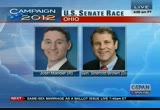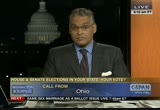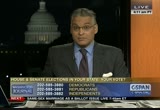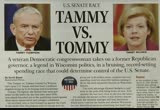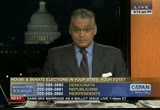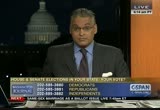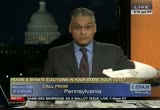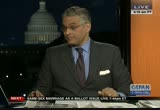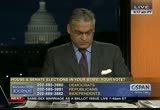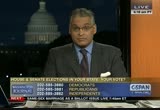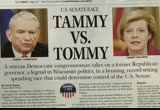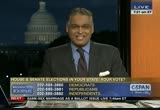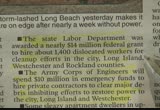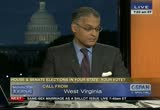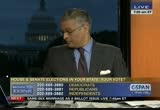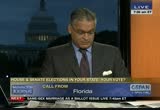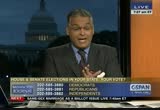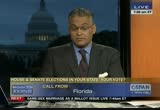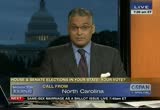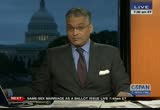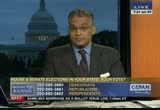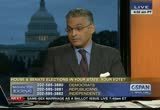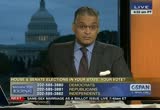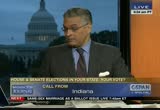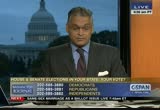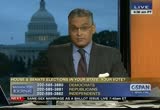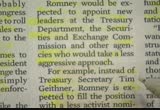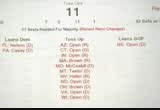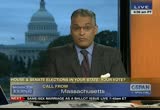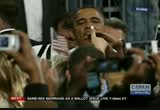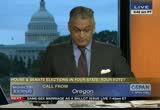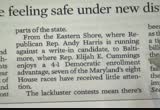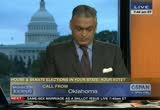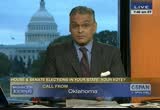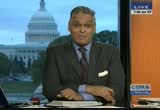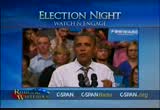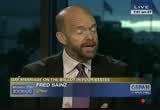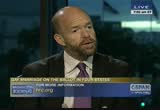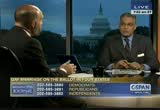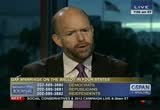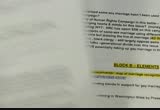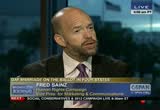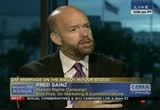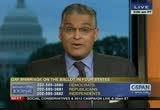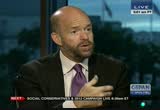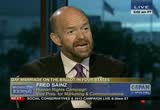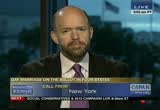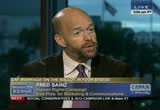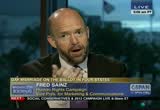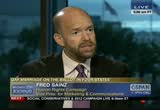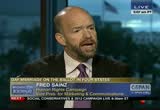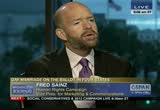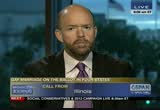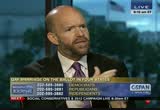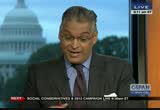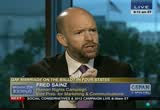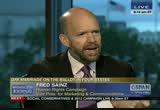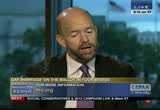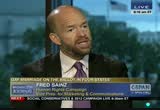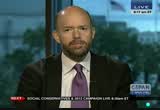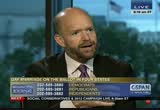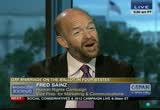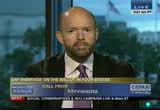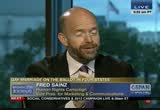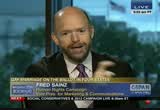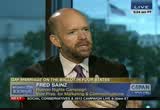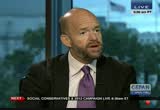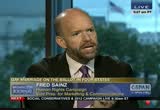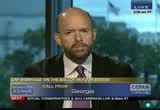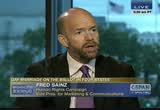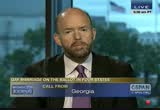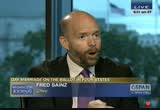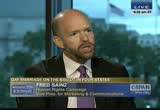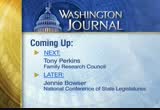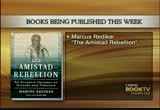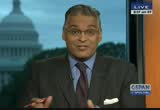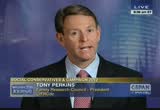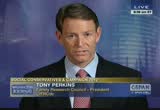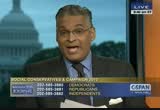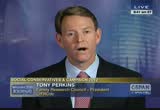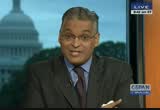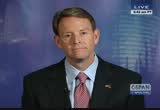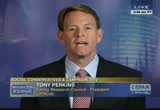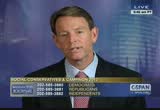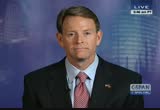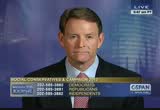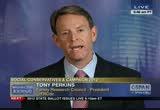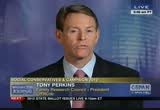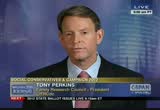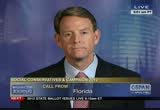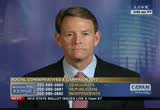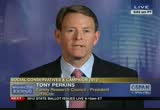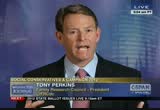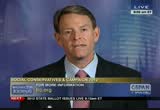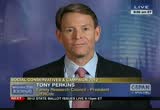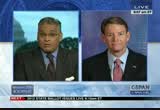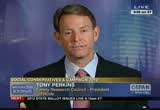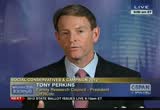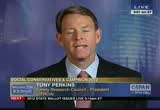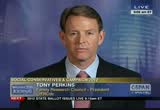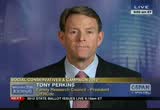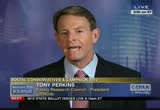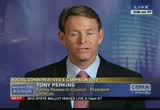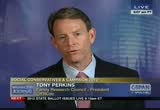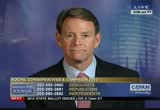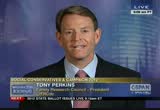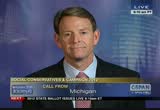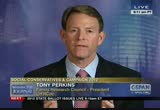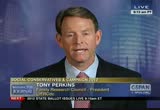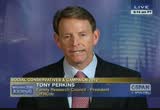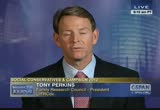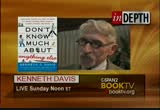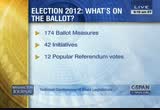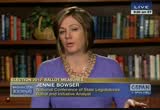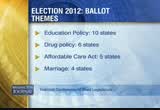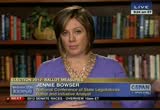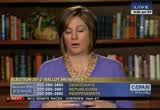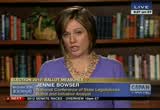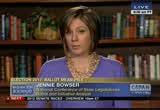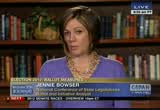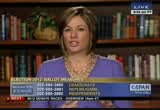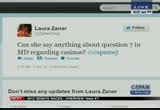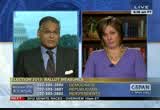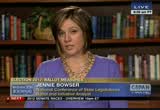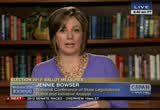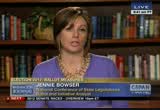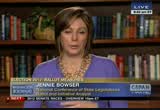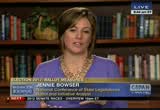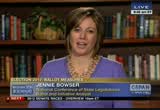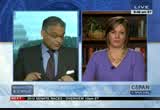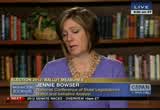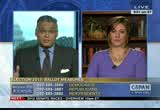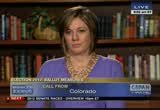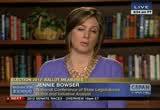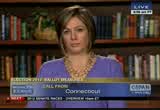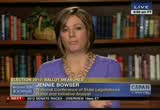tv Washington Journal CSPAN November 3, 2012 7:00am-10:00am EDT
7:00 am
later, the national conference of state legislatures looks at some of the other issues on ballots around the country. "washington journal" is next. ♪ host: president obama travels to buy ohi-- to ohio. mitt romney makes stops in hampshire, iowa and colorado. in colorado he will be joined by his wife. that is at the fallen for the 5 tonight on c-span and c-span radio. you can go to c-span.org for details hid for the next 45
7:01 am
minutes we are looking at a key house and senate races. e seats a 45th stat likely democrat. we will take a look of those the little. we love to hear from you about the house and senate elections in your state. how you plan to vote, tell us why. 202-585-3880 -- democrats. 202-585-3881 -- republicans. 202-585-3882 -- in the 10th independents. you can send us a tweet @cspanwj. you can send us an e-mail at cspan@journal.org.
7:02 am
or reach us on facebook -- facebook.com/cspan. here is a map. 46 democrats as far as the seats are concerned. a 43 seats now in a lot for republicans. any good to the top of states, they look at 11 toss ups. in ohio, virginia, wisconsin, those for some of t these dates toss ups. again, if you want to give us a little in the foot of the house and senate's races you plan on voting on come here are the numbers --
7:03 am
you can send us a tweet @cspanwj. this is the leader telegram. highlighting the race for the former the governor tommy thompson and tammy baldwin. the headline of -- in virginia, where sulman takes on a governor. -- a virginia congressman takes on a governor. tommy thompson on the ballot for 8, wasrst time since 199 almost knocked out in the qualifying round against three more conservative and vendor candidates. spending on outside groups top
7:04 am
of every other senate race in the country. roves group put out $5 million alone. again, the numbers will be on your screen. to tell us about the house and senate elections in your state. rob up first. on our line for democrats. good morning. how are you? caller: think you for c-span. host: are you in an area affected by sandy. caller: the area where i live on the upper east side, we are doing ok. but downtown manhattan is doing better now. the understand they are starting to get their electricity back. we are ok on the upper east side. host: are there concerns about
7:05 am
how people might be affected with election day? caller: not in this neighborhood. i am sure there are in some neighborhoods. they are talking about making the arrangements either through having generators, or the election booths or bringing back the old system of voting, i guess mechanical. host: when it comes to house and senate elections, what are you looking at? caller: tomblin to vote straight democratic ticket down the line -- i am going to vote straight democratic ticket down . in congress, senate and president, all of the individuals all over and over bolling to the religious rights against abortion rights. they are bowing to the rich
7:06 am
people. they are against slightly higher taxation. back to the clinton 4% increase. i know wealthy people in this town. pan on the other side of the country that will drop $50,000, $100,000 life is nothing. people who can well afford to pay higher taxes. i will never understand how democrat and republican, especially republican, i will never understand how or and middle-class people can vote against their pocketbooks and the cheerleaders for lower taxes for wealthy people. host: that is ron in new york. if you could to the front page of the indianapolis star, piloting the senate race there.
7:07 am
they said results are flawed. they indicate laws wants a toss up is now a double digit lead for his opponent. most significantly, women voters are driving the divide, according to the new poll. joe donnelly with 47% support. richard murdock support. and the libertarian getting about 6% of that support. silver like indiana. paul on our line for republicans. good morning. caller: good morning. host: your reactions on what is going on in your state? caller: our country was built on a religious freedom and also, in our old west -- and in the
7:08 am
history of becoming a free country, a lot of our beliefs were made of on the bible. they say life begins at conception. and have been hearing democrats talk about rich people. but you know, i think there are just as many or more rich people and the democrat sector of politics than there are republicans. because republicans did very heavily to charity. host: tell me who you are voting for in the senate race? caller: i will vote for the republicans. host: richard murdock was to mark the bank yes sir. i believe in the right of a one and two have control of the body, but, there's a lot that factors into this, too. i do not believe that our country should take abortion
7:09 am
around the world on a taxpayer dime. that is one of the reasons i will vote republican. host: and the governors? caller: under republican control of the senate and state, and governor, indiana has become a surplus state. by so many governors of the democrat-control states. if you do not believe it, just look of which states and cities are broke around the country. and you make your decision. host: we have got to move on. in ohio, the senator raise their. that is one of the state where watching as part of our campaign 2012 coverage. our next call from columbus,
7:10 am
ohio. this is vai on our line for democrats. caller: fellow how are you? host: tulsa about the races you are watching? caller: sharon brown is ohio. he has done everything. i do not believe he is honest. he said nasty things about mr. brown. he is a wonderful man. and he is great for ohio. i am also a veteran. i support all of the things that the president and the democratic party has done for ohio. i have seen many elections. i am 81 years old. i support all of the women's
7:11 am
rights groups. and with the president is doing for our country. now my daughter is from indiana. she is also a strong supporter of the president. we all work with the campaign. i have a brother in new jersey who is going through the terrible things that happened there. also in support of the president. host: have you done anything as far as the brown campaign in the state? caller: i am a little old for knocking on the doors but i worked and one of the offices here for the democratic party. i have been sick for the last three weeks, but i have knocked on doors. i voted on the second.
7:12 am
i have donated a small amount of money. i just bought something yesterday. i went out for the first time to the office to -- do something. host: that is milwaukee, wisconsin. next up, sharon. good morning. caller: good morning. thank you for taking my call. my situation is unusual. in the primary -- i voted for tammy baldwin. i thought i was glad to support her. and then i watched the debates between tommy thompson and tammy baldwin. and i have decided that i am blind devotion for tommy thompson. i think he has a really great handle on the issue. and he was a governor and i
7:13 am
think we need a new direction. and one other thought for, want to say -- i had been a democrat all of my life. i was a delegate in 1992 to the in newedemocratic convention york. but i have got to do the right thing. if not be swayed by issues of roe v wade. i tend to see more clearly now that i did when i was number. host: what was it about tommy thompson that made you change your vote? caller: is a little bit 1 conservative side. i think he is willing to work across the aisles with democrats. i feel like tammy baldwin, from
7:14 am
the debates, she seems so hard left. i think it would be difficult for her, someone like in nancy pelosi. i do not think we need that right now. here is what his vision somehow, we are one left to meet in the middle. i am sorry, i have been a democrat all my life. and is one of the hardest decisions i have to make and i am going to make it in a clear, a sound mind. host: what you think of that this is a battleground state. caller: 0 my gosh, i do not know. one moment i think it is mitt romney and then i think it is one of the obama. fortunately, i made my decision. it was the hardest thing to do. i am going with mitt romney. i really feel strongly and pull
7:15 am
this country to gather. and i think that we need to work across the aisle. host: got to leave it there. thank you. house and senate elections. that is how we are spending our time. today,sident's agenda ohio, iowa and virginia. and mitt romney travels to new hampshire, iowa, colorado, and if you want to see him and ann romney, what did tonight on c- span as well. a lot of things settled for tomorrow. pennsylvania of the next. on our line for democrats, hello. caller: good morning. i am in suburban philadelphia. right over the city line. i will be voting for becasey for
7:16 am
senator. -- i will be voting for casey. he is one of these tea party activists. who is trying to turn this state and weighty party stronghold. and with the voter id law that was struck down, we are one to reject him and send him walk to the dark ages where they belong. host: what about him to like the bus? having his moderate. host: what do you like about him in the most? caller: he is moderate. you know that just doesn't do it for me. host: william is in orlando on our line for republicans. caller: good morning.
7:17 am
i think our choice is very clear. i am of voting for romney but i am also voting for, and math hooverville -- i am also voting for connie mack over bill nelson. they have caused gridlock. and i have to laugh with the democrat john about gridlock. they are the ones that caused it. they are the ones that say -- we need to come across the aisle and work with them. they have never been willing to work with us. connie mack has conservative of values. he is a conservative. he will help governor romney when he gets into the white house. to balance our budget, to cut
7:18 am
taxes, to also reduce the deficit. my vote is mack. host: talk about commercials and ads on this race you have seen. especially the past couple of days and what you have been experiencing. caller: there are negative ads on both sides. never know what to believe. you see all kinds of negative things. the democrats, all kinds of negative things, the republicans. but you cannot base your vote on that. you have got to get their policies, principles, platforms, what they stand for, if they are conservative or liberal, and then, vote on that basis. host: had a thing florida will go over all? caller: overall it is one to go for romney. the polls are showing a couple point advantage to mitt romney. nelson, the democrat is ahead of
7:19 am
mack, but we are all voting for mack and help him. host: wisconsin, on our line for independents. caller: appalling about the woman from wisconsin, my state about the woman from a woma from wisconsin. they say the debt is being rolled over. he is not fiscally responsible. he was nicknamed taxing it tummy when he was here -- taxing tommy. he is not fiscally responsible. and i am voting for tammy and i do not even like her, just
7:20 am
because of that. host: why not? caller: i never have. i am an independent, i always thought she was too much of a liberal for me. i remember tommy thompson as governor. there's no way of would vote for him. tammy baldwin is not in my district. i have never voted for her before. but i am now. host: as far as ads and calls, what has that been like? caller: i hang up on all of the phone calls. i am tired of them. i hate it. there's nothing i can do about that. as far as the assets go, i do not know why anyone can vote for romney because he has put thought and allied. more so than any election that i
7:21 am
remember. and i am older. it has been just terrible. and then the fact that he will not release his tax is does bother me. host: you are going to vote for president obama? why so? caller: i do think he has tried very hard. i used to work in the health field. and i know how much people are so worried about government covering their health-care costs. i am on medicare now, certainly the government takes my. when i was working, you have no idea how many times, because i was the person who put the insurance payments into the computer when i came to the hospital, and you have no idea how the insurance companies to turn down a thing this. host: even though they make their comments known about the
7:22 am
presidential race, we are focusing on cost and said races in your state. a couple of stories, at this one out of new york when it comes to hurricane sandy, federal money do not up to states and hurricane aftermath, the first trickle of federal funds start to go out. 29 million to rebuild highways. $30 million to hire temporary workers to help with the cleanup. it is certainly to the multibillion dollar bill for the government. the federal office has 7.5 billion to spend. an additional 5 billion could be made available withinan offsets required in other government programs. that is in the new york times. when it comes to how the money is concerned, this out of the new york post. the state labor department awarded nearly 14 million grants
7:23 am
to hire a dislocated workers for cleanup efforts in the city, long island, westchester and rockland counties. we will go back to calls. on our line for democrats, hi. caller: hi. we have a third party and west virginia. the mountain party which is more liberal than democrat. and i m you know, pretty much agree with them. host: who is your representative? caller:. she is here forever i have tried to get rid of her. my senator is joe. ocoquan and i am pretty sure --
7:24 am
i am pretty sure he is going to be elected along with our governor. i feel free, because they felt and i understand why, that they could not support obama. president obama. i am just mad at them. and therefore, am going to go ahead and vote mountain party. as a protest, i am going out and about one hour. i am going to vote for the mountain party which is corporate to the whole issue is call and mountaintop removal. which of the mountain party is really good on, and of course, they are against for the most part, most of the people are against president obama because of his energy, clean energy and the fact that he really does the least.
7:25 am
will warming is a man-made. host: who is in the mountain party there? caller: jessie -- jessie it is not jackson. i am voting for jessie, but jessie jackson is from chicago. jessie johnson, and robert, who is also, i belive he is iunning for governer. it will be a protest vote. i am so dissapointed people
7:26 am
here could not vote. caller: a good morning. i am -- i cannot stand debbie. es. tells us so many liv and bill nelson is the biggest fake that ever came along. he is anything but an independent. but i was wondering if i could make a comment about abortion. everyone seems to think it is such an easy subject. i am the father of a daughter and two granddaughters. and i can tell you that the part of the abortion and question that people never talk about is the responsibility corp. for an unwanted pregnancy. when i was growing up, if you
7:27 am
got someone pregnant, you were going to marry them and that child was going to have your name. but look what has happened. birth control bills came along, so that if there was an unwanted pregnancy, it was the woman's fault because she did not take your pills. now, let us move on to abortion. we have the abortion now, so now that there's an unwanted pregnancy, not only is it the woman's fault that she did not take your pills, but she did not go get an abortion. host: with that in mind come who are you going to vote for as far as the senate race is concerned? caller: i am voting for the republican ticket. he is pro life, except in the case of rape or.
7:28 am
host: is that the sole reason you vote? caller: the economy is the overall issue. people to not talk about the blame for an unwanted pregnancy. i believe not the biggest conservative in the world has said that every baby born should have the father's name on that baby's name. host: tampa, fla., david, on our line for independents. caller: i am going to vote for connie mack. i think they should have term limits. bill nelson has been in there for many years. and if they are in there longer than a couple terms, i feel that
7:29 am
america needs not just to vote because they are in a party, but just to keep renewing congressmen and senators. i feel like after 20, 30, 40 years of them of being a senate or congress that they need a little -- they get a little more corrupt. host: what are you looking for from connie mack? caller: to fix the debt crisis before we fall off the fiscal cliff. if we do that, i thing that will be a extremely hard recovery on america. also, getting jobs back into the states. caller: carmichael , n.c., on our line for democrats. caller: i am voting for accountants mayor watt/.
7:30 am
he has been a good congressman. i remember when we haven't been looking jessie, this country -- i remember when we had him, we were last in every single the republicans talking about -- they are not going to reach across the aisle. thank you for letting me make my comment. ebra, on ourp is db =ebra line for republicans.
7:31 am
i am voting for mack. i am an american and a mother. i am voting for mitt romney because i feel that he is an american, he is red, white and blue. he is for this country. it only takes common-sense to know who in the to vote for, to save our country and to save a future for our children. i cannot imagine anyone not wanting someone to have to shell that they are an american or a legal citizen to be able to vote in the most important race of our lifetime, or at any time. also, hours the talk about libya. if we cannot keep our ambassadors eighth, our the people running our country going to keep our country save? host: if you have to pick up one thing in neighboring, what is the one specific thing?
7:32 am
caller: is a common sense race. romney is the only ticket but we have. number one i am american before anything else. host: marc williams says -- there's no real choice in the 12th district in georgia. the democrats will be reelected. brett is up next, on our line for independents. caller: we have a eleanor holmes norton. i will be voting for her. i m an independent. i would consider supporting mitt romney except, i think is mendacity, according to david brooks, a good conservative commentator, he is almost like a medici. he backtracks and says too many different things. we need a senator here, too.
7:33 am
eleanor holmes norton as a lot of good. as far as political i have onlyn, an, gotten a text message from the gop. about abortion. bible does not say about -- anything about conception beginning at birth. it takes a good analyst and reporter who travels overseas to analyze these things over time. and it looks like the cia was more responsible for the libya stuff. the ambassador chose to go to benghazi. he left the embassy. is partially the state department's fault. it is dangerous for americans to do stuff overseas in places like that. the conservative talk shows have gone overboard in their
7:34 am
commentary about libya. it is really nobody's fault. host: "new york times as a piece looking at petraeus. if you wanted to read it later today. on thursday with him away in the middle east, intelligence officials give their own account of the chaotic night when two is pretty officers died with the american ambassador. and another diplomat. the officials acknowledge that the security officer work on contract with the cia. a little bit from that story on the front page of the new york times. house and senate elections and how you are going to vote. this is perryville, indiana, steve. caller: i am voting straight
7:35 am
democrat. there is no way that the republicans are going to help anybody. they are wanting us to let the rich have a more money that is ridiculous. if the republicans did in it will be the worst. host: from florida on our line for republicans. caller: i am a young republican of the millennial generation. and unfortunately i had to make the decision to vote democrat. i feel like, especially in the senate, the democrats need to take control of something, because if there were a mitt romney administration, there's been a lot of talk about things social issues that, again i think my generation is far more
7:36 am
liberal. and i think the moment for me was just when barack obama was elected president and mitch mcconnell tempore ribbons said -- let us make him a one-term president. i did not think that was a fair shake. i think there would have to work together and we would see more bipartisanship going forward and another four years. host: why not support mitt romney? caller: i am not really voting for the president as much as i am of voting against mitt romney. at the end of the day, the positions -- is about character. his been all over the map. i did not do not know what he believes, do not know what he stands for. that is really hard for me to judge someone.
7:37 am
i can see the president's record anticipate some decisions he might make in the future. i cannot anticipate what a mitt romney administration might be. host: they both have op-eds any washington street journal. -- wall street journal. for romney, a new direction for america. and obama -- real progress, but we are not don. you can go to the wall street journal to see more of that. should mr. romney went, it says if mitt romney wins next week, enough democrats would probably be left to block his promise to roll back wall street rules enacted in response to the financial crisis. romney would be expected to appoint new leaders of the treasury department, securities and exchange commission and other agencies that would take a
7:38 am
less aggressive approach. instead of timothy geithner romney is expected to fill the position with a less activist nominee. in addition, a romney administration could leave some posts under weekend acting heads. florida calling in, tom on our line for independents. caller: i am voting for romney mack. i would like to see romney in the senate. i do believe he is out there with his friends having a good time. and you show me your friends are. host: a toss up when it comes to seats in the senate. 11 seats. arizona, connecticut, indiana,
7:39 am
massachusetts, montana, virginia, wisconsin. massachusetts, this is -- on our line for democrats. caller: thank you for c-span. i am a democrat, and voting for obama. i am voting for elizabeth warren. i do not understand how any woman could even think about voting for romney or any of those republicans. the republicans think women are second-hand citizens. did not even want you to make the same money they make they do the same job. want to legislate their bodies. my mother was a wonderful woman. but they must think their mothers are dumb. host: why is elizabeth warren
7:40 am
the right person for the job? caller: because she is a lady, she is a woman. i trust women in politics much more than men. host: how would you address scott brown's term in office? caller: empty suit. he just looks good. caller: curtis. host: tell us where you are looking on the senate race caller: george allen all of the way. the first time i was voting i voted for reagan. i always go straight republican. i want to get george allen back in there. we have to undo the mass that barack obama has done to this
7:41 am
country over the past four years. i have been waiting for this, just waiting. basically what i want to say is like one of the first caller said, i cannot understand why anybody who is in poverty or the lower echelons, even lower middle-class, would vote for romney. it is like, they are not going to do anything for them. what they need to understand is that with the policies that obama has implemented, it is destroying our children and grandchildren they will be paying this back four years. people need to stop being so greedy. me, me, i , i. what can you do for me? i did not think it is that hard to understand. look out for your kids and grandkids. the democrats that keep calling in on the republican line, that earlier caller that it was a democrat and he was -- a republican but said he was voting for obama.
7:42 am
he was not a republican. and he crashed mitch mcconnell. -- trashed mitch mcconnell . host: richard on our line for democrats. caller: good morning. the lady that talked about libya. host: common eider house and senate races first. what are you watching? -- tell me about your house and senate races. er: i am a democrat. --all we need is a president that can keep the story straight. i want to get back to libya if i
7:43 am
can. if you are going to run for president and you say your new one of the seals and you really feel bad and you did not even know the seal, it is pretty sickening. the republicans call in, libya was a tragedy. but how about 9/11? maybe bush and cheney ought to go in front of the congress. host: baltimore sun talking about -- john fritz saying no challenger. they seem to be cruising to reelection. andy harris is running against a
7:44 am
write-in candidate. this is lee, okla. on our line for independents. hello? you are on. caller: this is leigh. this is my first time to get this much involved in politics. but my husband's family were democrats, naturally, he went along with his father. we registered democrats and we live in texas and that is how we voted.
7:45 am
wasmy mother's father republican. i think my dad was a democrat also. but i had a very wise government teacher who said he thought he should vote for the person. he was very much to voice his opinion, i think he is a great man. i hope he is still living. he said those who vote straight democrat, or straight republican ticket, he felt that they did not really know what was on their ticket. host: who do you plan to vote for? caller: i am going to vote for mitt romney. si i moved. so i lost my registration.
7:46 am
and i tried to register for the 2008 -- host: how about your house and senate races? caller: i am watching cnn. host: we are asking people as far as house and senate races, and who'd you plan to vote for? caller: the thing about it was, i would have voted for the person. we have a governor, we also have a woman mayor in tulsa. is a christian man. host: thank you crawl of you have -- who have participated.
7:47 am
for coverage on what happens with the president and house and senate races, we invite you to go to c-span.org for more information. especially on election day. and find out more information. we have many come a majority of the key senate debates, house, too. online for you to view there at c-span.org. coming up, there is the same sex ballot initiative on four states this election day. we will speak with fred sainz of the human rights campaign. and we wanted to let you know is ours is a joint project is concerned between book tv and american history, it is a month hilliard, vt. weekend. -- montpelier, vermont.
7:48 am
it has a population of about 8000 people. it is the smallest united states state capital. at 12:00 p.m. we are going to focus their book programming. we are touring northeastern state capitals as we work with our cable partners to bring you more about what the cities are about. here is what you will see come a short clip of a book owner that will talk about the literary culture there and how the store has survived for nearly 40 years. >> this is really a community bookstore. people have been coming here since the beginning. children have grown up here. we definitely like being part of the community. i do not think you will find too
7:49 am
many towns at 8000 people will support three bookstores. at one time we had five. you do not find that too many places anymore. mostly independent bookstores are closing. some communities are supporting more and opening stores, but many are closing. some stores have been in business almost 40 years like us, and are closing. this is a community that values the books, values are reading. we have a lot of writers. and it is a commodity beyond that, they value independent stores. there are not a lot of big box stores. makes a huge difference. if a barnes and noble had come into town from either not know if we would still be there. but it did not. and, there are certainly, there were arms and nobles and other
7:50 am
towns nearby. long before this started, the committee understood that if you wanted to a bookstore you had to shop at the bookstore. >> the president has been trying to find a new idea, because in those people are not happy with what has happened over the last four years. we have had three presidential debates, one a vice presidential debate and the president was unable to put forward a plan to get the economy going. he says he will do more of the same period a became out with a brochure lately, a lot of pictures in it. but no new ideas to get the economy going. and then the camera with an idea last week he will create a department of business. >> the future, the future doesn't have lobbyists. there will never have as many as the vested interest. it is the dreams of the children
7:51 am
that will be our saving grace. that is why i need you, colorado. that is why i need you, boulder. to make sure their voices are heard. to make sure your voices are heard. we have come too far to go back now. >> election not on c-span. live coverage of president obama in chicago and mitt romney in boston. and your reaction, by phone, e- mail, facebook and twitter. look for live coverage beginning at 8:00 p.m. eastern. "washington journal" continues. joining us is fred sainz, of the human rights campaign. why is the same sex ballot important? guest: marriage equality has
7:52 am
never won at the ballot box. we have four races across the country. we stand a good chance for marriage equality to really be a firm -- affirmed by voters and our country for the first time in history. as a very important one for committed and loving gay and lesbian couples across the country that want nothing more than the freedom to marry. host: what states are involved? guest: the state of washington, maryland and maine. and in minnesota we are fighting a constitutional amendment that would prohibit marriage equality. legislature is in both of those states, they passed a law into effect, and catholic governors in both of those states signed
7:53 am
those bills, both of those states have laws that allow citizens to go and refer it to the ballot. that is the question that will be before voters in november. activists and main affirmatively took marriage equality to the ballot in november. those three states, a yes vote would result in a marriage. so what happened in minnesota, last year republican legislators in the midst of a budget crisis the side of the wise thing to do for their state would be to take up the issue of marriage equality and said of dealing with other problems. seven. the measure on the ballot, a constitutional amendment that would prohibit the same-sex marriage. and the legislature was able to refer directly to the ballot. that is what will appear on the ballot in a few days. host: what has been the track
7:54 am
record when dealing with this issue? guest: we have lost 32 out of 32 times. that is clear. at the same time, the vast majority of those ballot measures were in 2004, 2006. that is when the largest number were on a. and if you look at polling trends since that time an american evolution since the time, we have come a light- years. 2012 as an entirely different set of circumstances it was and 2004, 2006. americans have come to know and appreciate the gay and lesbian couples, and really now understand, i think, in a much more in a much more evolved way that really gay and lesbian couples want nothing more than a freedom to marry and love and commit to one another. and so is a very different set
7:55 am
of circumstances. that is why we think we of a historic opportunity this time to win as ballot measures. host: our guest with us to talk about gay marriage being on the ballot in four states. you ought to ask the questions, here is how you can do that. for democrats -- 202-585-3880. republicans -- 202-585-3881. independence - 202-585-38802. you can send us a tweet @cspanwj. you can send an e-mail to cspan@journal.org. talk a little bit about proposition 8 in california. as the impact what could happen this time around? guest: let me go back and say, marriage equality is no longer a partisan issue. if you look at socio-economic trends across this country, americans from all walks of life, all parts of this country, all sorts of americans,
7:56 am
republicans, democrats, catholics, episcopalians, they all support marriage equality in majority's right now. that is probably one of the largest of allusions of has taken place since 2006 and 2008. you are right. perhaps the most high-profile marriage equality battle took place in 2008 in california around prop 8. unfortunately, we lost by just a few percentage points. as a result of that, prop. 8, a group called the american foundation for equal rights decided to launch a constitutional challenge for that vote. and it stands for is right now before the supreme court and on november 20, they will decide whether or not to take up that case. host: a paul talking about support for gay marriage. referenced that 50% of those who were polled, say it should be on
7:57 am
the ballot. a 50% saying it should not. guest: if you look at polling trends just over the course of the last 15, 16 years, support for marriage equality has increased by as many points -- by many points. we go about 2 points a year. that is an incredible job. what that is reflective of, americans from all walks of like getting to know their gay and lesbian neighbors, co-workers, brothers and sisters, in some cases parents. and we found that as americans get to know us and find that there's really common human bonds and between us and them and we really want nothing different than they do, support for our equality. and i think that is reflected in the number you noted. host: fred sainz talking about gay marriage on the ballot.
7:58 am
a first call on our line for democrats, gigi. caller: i think it is horrible that this gentleman thinks that two men and two women should be able to get married. i think marriage should be absolutely between a man and a woman. and nothing else. i believe that gay people should have the right to live together. and do what they want to do. but i do not absolutely believe that it is right for two men or two women to be married. i think it is horrible. guest: i appreciate her point of view. and it is a journey that a lot of americans are on. i do believe that an awful lot of americans struggle with this. for us, this is really rooted in the quality. and whether or not a gay and lesbian americans will be able to live as full citizens in the
7:59 am
country that we love, a country that we die for, a country that we serve every day. no different than our straight brothers and sisters. the concept of a marriage as a word is rooted in federal law, approximately 1300 times. any other institution other than a marriage, it really is a second-class institution for gay and lesbian americans. we are really not looking for anything different. we are not looking to distinguish ourselves from our straight brothers and sisters in any different way. we are not looking to change the institution of marriage. we are merely looking to strengthen united states and strengthen our families and protect them. i clearly understand the caller's point of view. understand how americans are on a journey. i think one of the things that has defied the movement is that we are always willing to meet americans were they are on this journey towards equality and continue that conversation with
8:00 am
them in order to explain to them why, what we are doing is so incredibly important. not just to our own lives, but to the basis of democracy. host: what is the work these then? guest: we have invested $5 million into the quarter ballot initiatives and to efforts of marriage equality, approximately $8 million over the course of the last two your election cycles. which includes new york, which got the freedom to marry last year as well as bottles and new hampshire and other states. we are on the cusp of equality in these states. we have an amazing opportunity to really kind of demonstrate to americans that marriage can win at the ballot box. and chief a historic step for not just a gay and lesbian americans across this country, but to strengthen and propel our
8:01 am
democracy forward. host: steve. caller: i am against any laws banning gay marriage. .said do unto others as you had others do unto you. guest: clearly, i appreciate the sentiment. we, as i mentioned, we really are looking to be nothing more than to commit and love are significant other, and be able to protect and build our families. it comes down to nothing more than a common human bond that we share with all americans.
8:02 am
that is why i am willing to commit to our life partner. and be able to protect them to the extent that my parents were protected or my brother and sister and a law and their newly -- and the host: he quoted the bible. has there been a change in attitude? guest: i think americans see it as an extension of the golden rule. and i think that people of faith in large numbers now support marriage equality because they believe it to be an extension of their faith, to basically treat all equally. it becomes increasingly hard when you have a thoughtful rational conversation on this issue to want to distinguish in between gay and lesbian americans and everyone else. the arguments fall apart very quickly. so people of faith, catholics support marriage equality by 60% when you make clear that what you're talking about is a
8:03 am
civil marriage license that's issued at city hall and there are clear cut religious protection that is in no way shape or form compel any church or synagogue to allow gay and lesbian couples to get married that support goes up to 70% and we find that cloose all relinls lines. so this is an issue that is no longer divided by partisanship or religious lines. it is an issue that fair-minded americans think about more around the dinner table or the barber shop or work or school. they find that it's an issue that they can really come to understand and support. host: roy from new york. good morning. caller: i absolutely disagree with what this guy is saying on your program right now. and i absolutely agree with the
8:04 am
first caller. men should not be with men, period. all right? you know, i live in new york state and i ride the subway all the time. the gays are p constantly on the train hugging, kissing. they have no respect for children. they have no respect for women. you have a male bloomberg -- mayor bloomberg who just gave $10 million to the gay effort. this country is moving in the wrong direction. i'm so upset with this. you know. look at what happened to sap dusky. you know. and this guy's on television promoting gay marriage? you know. this is what i call the brain washing of america. >> i definitely appreciate the caller's perspective. i obviously disagree with it.
8:05 am
my parents are cuban american immigrants to this country i'm a very proud american. and i feel as a gay man as a may american as much a part of this country as anyone else. and i believe that gay and lesbian americans across this entire country contribute to our country. and we want nothing more than the ability to be able to commit to our life partner and be fully part of american society. you know, and so from that perspective, the freedom to marry, to really kind of strengthen the institution of marriage is a part that we view as an extension of our citizenship. i think one of the things that has really defined the movement for marriage equality has been a very respecific of the conversation with americans from all walks of life in order to really kind of explain and establish the common human bonds that we have with all americans. whether it be the caller with
8:06 am
his perspective or whether it be the supporter from north carolina that called in. and we will continue to have that conversation. so we understand that the goal here is to really kind of continue to establish the common human bond with individuals like the caller from new york. at the end of the day, i can assure him that i want nothing more for my family or my future than he wants for his. i don't want anything different. i don't want anything strange or uncommon. we share basic human values together. and that's nothing more than the ability to love and commit to our significant other and to have american society and american law recognize and protect our families. there really is no difference in between what gay and lesbian americans want for themselves and what straight couples have right now. host: so why not civil unions? >> it's a very different institution, it is a second
8:07 am
class institution. civil unions are ok in some states. they were definitely part of the journey towards marriage. i have a great deal of respect for the states that passed those. but unfortunately the word marriage is the only word that is recognized in federal law approximately 1300 times. so when it comes down to protecting our families it is really only the institution of marriage the right to marry that will give us those protections. i will tell you we are on a journey here as americans continuously on a number of different issues. so we have to understand that we are looking to be treated as equal in the eyes of the law and equal in terms of the common human bonds that we share with all americans. and it is really only marriage that gets you that equal standing with my straight brother and sister. host: so what protections would be different under a marriage than civil unions? >> right now the federal
8:08 am
government has a law in place called the defensive marriage act which basically means that same sex marriage cls ducted in the six states and the district of columbia that have marriage, for example, let's say that a couple gets married in massachusetts and god forbid one of those partner dies. the federal government has a law in place that does not recognize that legal marriage. so for the purposes of things like social security survivor benefits or internment in federal cemeteries or a whole number of laws having to do with tament tax treatment and things like that. that couple in the eyes of the federal government is not recognized as having been legally married. as you can appreciate in the case of death or some kind of family turmoil, that often has led to the emotional and financial devastation to that family. so for federal law purposes at least, the word marriage and the institution of marriage is incredibly important. but really it goes much deeper
8:09 am
than that. it's really wanting to be treated as equal citizens under the law. host: our next call comes from illinois. sue, democrat's line. good morning. go ahead. caller: my question is that maybe if you just changed the wording from marriage to civil union that maybe you'd get what you want to accomplish which is the ability to have decisions made about your partner. my beliefs are my beliefs but i also grew up in the deep south in the height of desegregation and i believe that for me to have freedom you've got to have freedom because we're a democracy. so stop fix yating on the word
8:10 am
marriage. go on and go with the civil union and get new laws that will allow you to have everything just like the married couple would have under the law. and accomplish your goals. and that's what i have to say. >> i appreciate sue's perspective. i should have made this clear earlier. what we are talking about here is a civil marriage license. it's really a license at city hall gives you. and so marriage is an institution -- it is what we're talking about is a civil marriage license. under all of the states that are considering marriage and all of the states that have marriage equality right now, all of them have very clear cut protection that is no relicks -- relidges institution has to go ahead and perform a marriage if they do not wish to. so we are talking about a civil marriage license as opposed to something that a church or
8:11 am
synagogue would give you. but going specifically to sue's call -- and i understand the premise and i think fair -- this is an issue that good fair-minded americans could disagree on. the concept is really how we achieve equality for all americans. and civil unions, while an important step on this journey towards marriage and full equality, simply are not an equal institution. they do not provide our families with the protections and the equality that marriage provides. and so while i think a thoughtful question, it is important for americans to know that civil unions simply do not offer us equal treatment under the law and they really are, you know, a very different form of separate but equal. and we're looking for nothing more than to be treated the same as our straight brothers and sisters are. host: there are adds known by
8:12 am
an organization called preserve marriage. >> referendum 74 is not about equality. gays and lesbians already have the same legal rights. marriage is more than a commitment between adults. when laws like 74 have occurred elsewhere, people who disagree have faced lawsuits, fines and punishment. you can oppose same sex marriage and not be anti-gay. reject 74. >> so this is an ad that virtually the same ad is running in all four states. it is full of the same kind of deceptive lie that is we have seen our opponents use when attacking the issue of same sex marriage. and the ad is really kind of riddles with inaccuracies.
8:13 am
host: it list prod tex that is the ad says that already exists. even if you didn't have marriage as far as same sex marriage goes. >> to that extent it is true but by no means do the protections apply equally to same sex couples. it's not the same treatment as marriage affords those and we are really kind of looking forward the same kind of treatment. and the word marriage valleyly kind of port rnt to us in terms of being able to provide the same standing. but going to basically the attacks in the ads that are kind of false. the ad makes you believe that in the six states and the district of columbia that have marriage equality in place, there have been a number of different problems. and in fact there really have been none. you can -- along the way, there are always going to be issues here and there. but we are talking about maybe like one or two issues that
8:14 am
definitely do not define the institution of marriage. for example, iowa has now had marriage for approximately four years. and a colleague of mine is quite fond of saying the cows in iowa are still giving milk, the sun still comes up, and puppies are still cute. so nothing has changed. the only thing that has changed is that that state and the other states that now offer marriage equality provide their citizens with a more equal and welcoming union. that is really the only difference in between before marriage equality and after marriage equality. and that's an issue that the opponents of equality really do not face. they want to make it appear as if marriage equality will bring huge devastating ominous effects and they try to scare thoughtful good people into believing that there will be an awful lot of problems. and the truth is that there will be no problems at all.
8:15 am
and that the only net effect of marriage equality in the states will be really a more equal and welcoming state and country for all americans. host: you mention it had defense of marriage act lfment the supreme court consider that? >> november 20 is an historic and important day for lgbt americans the supreme court that day will conference on six cases. the first case that i mentioned is around the constitutional challenge to proposition 8 coming from california. then they will consider a case coming out of arizona around the offering by government there of domestic partnership ben fints. the incumbent governor is trying to take benefits away from gay and lesbian employees of that state. and the then the supreme court will consider four challenges to the defense of marriage act. we hope to know the following
8:16 am
monday as to which, if any, of these case it is supreme court takes up. in the case of proposition 8, the first case of the supreme court decides not to grant crert to that case, marriage would go into effect in california within a matter of days. so approximately 25% of the u.s. population would then be afforded marriage equality. obviously in the case of domestic partnership benefits to arizona government employees, it's a case of whether or not they're able to continue to receive those benefits. and then in the case of challenges to doma, what it would mean if the supreme court takes up the case and eventually owe pines in favor of equality and strikes down the defense of marriage act what it would result in is nothing more than in the states that have marriage equality, the federal government would have to recognize those marriages and offer federal benefits to the same sex
8:17 am
legally married couples only in those states. not really a marriage case. it's nothing more than the federal government recognizing legally valid same sex marriages in those states for federal benefit purposes. host: the human rights campaign, vice president for communications. this is citrus heights, california. richard is on the line on our republican line. go ahead. caller: i don't know where to start. this is so ridiculous that this man, fred, -- i just turned on the television. and he has to plead his case and ask for just human rights just like we all have. first, i'm a vietnam veteran. i'm straight as an arrow, even though i am from california believe it or not there are straight people out here. and this poor guy has to come on and basically beg for the right to be happy and
8:18 am
rights. we all have the same rights i thought in this country. and i just don't understand this whole thing where people tp just deny other people their human beings to be happy -- for happiness and to be with the one they love. if he marries somebody, how is it going to affect me or hurt me? you know? i don't understand. this whole thing should be settled and -- it just frustrates me that we're going to spend tons of money on this for basic human rights. >> well, as a proud california en i thank richard for his call and clearly i appreciate it. i should make clear as well that gay and lesbian couples being able to be married in no way shape or form affects the marriages of our straight brothers and sisters. you know. as many folks are saying
8:19 am
especially in these four marriage states that have valid measures the marriage of a straight couple will no way be in comb pacted by the marriage of loving gay and lesbian couples. it only strengthens our democracy and allows us to protect and care for our families. but i guess i want to go a little bit further and say that clearly marriage is in the headlines right now. but lgbt people across this country really lack some very basic legal protections. it's still legal to be fired for being gay and in 34 states based upon your gender identity. we don't have a federal law that prohibits employment nondiscrimination. so in many ways we are looking for nothing more than basic legal protections in order to be treated equally as american.
8:20 am
and we still have a very long way to go. there is no doubt that we have come a long way since 43 years ago. but really our community lacks very basic levels of protection across this country. and so day in and day out that's what the human rights campaign fights for. and we believe that our citizens -- that all citizens of our country, whether they be lgbt or straight, deserve very basic legal protections. the ability to work, to provide for your family, to be treated equally where federal benefits are concerned. you know, i think it was an incredibly historic moment just about almost two years ago when our congress repealed don't ask don't tell. and there we were talking about nothing more than very proud americans wanting to fight for and defend the country that
8:21 am
they love. and it seems right now almost kind of ridiculous that we would be talking about the fact that gay and lesbian service members would not be able to be out so they would be able to fight for their country and die for their country but they wouldn't be able to do so in an honest way. that luckily has changed. but we still lack basic legal protections across this country. and one of those is the freedom to marry the person that we love and want to protect. host: minnesota, independent line. caller: good morning, c-span. well fred, i don't know where to start. i'm in minnesota i'm definitely for -- in our country we're very tolerant. i hope to say nonjudging. but when it gets down tom -- i
8:22 am
don't know if you've ever been to a gay pride parade or if you are gay, but those don't look like family kind of oriented functions and how you're kind of presenting your sales spiel here. i have an issue with it because i don't feel that it's natural. i mean, i don't know -- maybe you can answer, maybe you can give me some sort of education on this. but for the most part, i mean, naturally animals in the wild do they naturally go after their own sex to reproduce? i don't think so. age sex is -- >> let me answer the caller in very direct terms. sex orientation is a characteristic of being human. i think put more simply, i was born this way no different than straight americans were born straight. one of the questions that i
8:23 am
always like to ask people when we're having this conversation is when did you choose to be straight? people think about that for three or four seconds and they're like well i didn't choose to be straight, i was born this way. well the same applies to me. i can assure you that nothing happened. i didn't really have a conversation with myself and decide to be gay. god made me this way and i'm very proud of that. and so to the extent that we understand that the caller was born straight and i was born gay and we're able to kind of get over that understanding, then i think we come to an easy conclusion that we both deserve to be treated equally. not just in terms of our common human relationships but definitely where the legal protections that our country affords are concerned. let me also speak to gay pride parades because i think that this is really an important subject. gay pride parades are no different than going into a
8:24 am
straight bar and seeing the diversity of straight americans. it's all over the map. so those festivals are really nothing more than a bunch of people coming out and wanting to celebrate who they are. there is a huge diversity. there are people like me that show up in shirts and tice, and there are people who choose to dress otherwise. but i assure you if a this we go to a state fair probably where the caller lives, we're going to run into a diversity of america from all walks of life. so those events should not be taken out of context because it's just as easy to go to any kind of event and take people out of turn and try and make it into a generalization. but nonetheless, americans from all walks of life it should not matter in terms of our ability to be treated fully, equally as
8:25 am
american citizens and enjoy the same rights and liberties and freedoms as all americans. and i assure the caller that really we are looking for nothing more than equal treatment under the law. nothing different. it goes back really at the end of the day this is nothing more than a discussion about the golden rule. wun wanting to really kind of treat others as we would treat ourselves. host: what's been president obama's influence? >> well there's absolutely no doubt that president obama has kind of led the nation in a very thoughtful conversation and eeflution about this issue. i think president obama really was on the same journey that many americans are which is really kind of thinking about the issue and in some ways he expressed candidly that he struggled with the issue and at the end of the day paraphrasing his statement here he had a conversation with his daughters and he -- and his wife and he
8:26 am
understood basically that it was about the golden rule. so the president has been very thoughtful and in may of this year announced that he supported same sex marriage for committed gay and lesbian couples. so the president has been incredibly courageous in expressing that point of view. and i think that has caused an awful lot of americans to reflect on their own points of view, especially those that are on the journey to wanting to treat all americans equally and specifically those that want the freedom to marry. and so in places big and small across this country, barber shops, dinner tables, work places, people are continuing to have that conversation and the president has definitely accelerated that conversation. host: mitt romney's history on it and your thoughts on if he becomes president his actions on it? >> well, this election offers a very stark difference,
8:27 am
especially for lgbt americans really but for all fair-minded americans. these two candidates could not be different so that makes this an incredibly important election for lgbt and for all fair-minded. in president obama we have the most supportive president in history on behalf of issues of equality. whether it be his position on marriage equality, whether it be him repealing don't ask don't tell and signing hate crimes protection issue. putting into place over 25 incredibly important and impactful policy changes from hospital visitation to allowing folks into this country whose hiv status was positive really incredibly porpt affirmations of equality. with mitt romney unfortunately our community would go backwards. he supports absolutely no measure of equality for gay and
8:28 am
lesbian americans. and so really for our community it's a very proud affirmation of this president's contributions to our country and wanting to see those advancements continue. host: here's savannah, georgia. james. caller: i'm for gay marriage. and i feel like everyone has its whole labeling thing putting everyone in the same category. and if you're gay and if you're straight i feel like if you are successful and you have your own business and you're going about doing things to help the world then i think it shouldn't matter on who you marry or who you see eyes for or anything. because i feel like everyone should have the right to do what they want to do. but when it comes around to something that is who you love it's a big deal.
8:29 am
>> i think the caller said it well. one of the things that i would like to talk about is that the construct of gay marriage is really something that newspapers have come up with in order to have kind of a quick headline. we're really not interested in gay marriage. we're interested in marriage. so we're looking for nothing more than just kind of equal treatment. a civil marriage license, if you will. but i think the caller got it right. we're looking to be able to love and commit to the person that we want to share our life with. and it's really nothing more than that establishment of the common human bond that my parents shared for over 40 years that americans from all walks of life, from all religious backgrounds from all partisan lies share. and i think that we've seen americans really kind of continue to be on that journey, support the same sex marriage
8:30 am
is now at 50% or above and i think we'll continue to see increases in those numbers. as time goes by. because i think most americans really have gotten to the place where this caller is. which is understanding that we are really not looking for anything that is rare or separate here. we're looking to share an institution and be able to love and commit to our significant other . host: last call from georgia. republican line. judy. caller: our creator gave us certain biblical understandings of what marriage is. i do not believe that we are to judge others. i do not believe that we are to be -- we are to love others. but we should not take a word
8:31 am
that means between a man and a woman and make it something else. and i do believe that our country will continue to hurt from that. now, so if you choose to have a civil union, two men, two women, don't call it a marriage. but it's not for us to judge. our creator will judge this in the end. and we will live with that in the end. and i thank you. >> look, let me offer a few things first of all. we have marriage right now in six states and the district of columbia. nothing bad has happened. if anything, our country is more just and more equal especially for those gay and lesbian americans that live in those six states and the district of columbia. marriage is a civil construct. what we are talking about is getting a civil marriage license from city hall.
8:32 am
we are not talking about any kind of religious affirmation of a marriage. that is something that churches and synagogues are able to make their own decisions on. and i should offer by the way that there are many religions that are completely welcoming of marriages. episs copal church is a very good example. so what we're talking about here is really the granting of a marriage license by a civil institution. going down to city hall and getting your civil marriage license. while i completely understand and honor the caller's concept of not wanting to judge and wanting to treat all equally, at the end of the day the only way that we achieve that is by offering all americans equal protection under the law. and really only a civil marriage license when it comes to the recognition of our families provides that. so it is important to hold on
8:33 am
to the concept of wanting to protect all americans. and i would continue to engage with the caller and really kind of all thoughtful fair-minded people that are on this journey. but what i would offer is that if we really are true to the concept of equality in this country and really wanting to treat all americans equally, and there's a thoughtful conversation of the issues at play and we don't want second class institutions for some and kind of different treatment, i think we eventually get to the argument that marriage as a civil construct as a civil marriage license is really the only way that our families can be treated equally. host: thank you. guest: thank you.
8:34 am
8:36 am
i know i speak for all of you when i say that he will be our president and we'll work with him this nation faces major challenges ahead and we must work together. >> i just received a telephone call from the governor. and i want you to know he was most gracious. his call was person al and it was genuinely friendly and it was in the great tradition of american politics. host: joining us from kansas city, missouri.
8:37 am
tony perkins. serves as their president. welcome. >> good morning. host: if we could continue on, on our conversation. specifically when it comes to campaign 2012 but looking at the state level on four ballots this year, initiatives for same sex marriage what do you think about that number of initiatives on this year's ballot? >> well, we've seen 31 states over the last dozen years have voted on this. we've got 30 states in total have voted on some measure regarding marriage. we have 30 states that have constitutional amendments. we have two states of these four that are voting on amendments. you've got minnesota voting on it, you've got washington state voting on an issue regarding marriage, maine voting on an issue, and then maryland on a marriage amendment. so four states and it's pretty competitive in those states . host: our previous guest talked about the need of having a
8:38 am
definition of marriage rather than civil unions and the frokeses offered -- protections offered under federal law. give your take on that perspective. >> we've got to go back and talk about what is marriage? what's the purpose of marriage? marriage has been recognized, the union of a man and woman, the product of that is generally children. and marriages have been extended certain benefits from government recognition, special recognition because it benefits society. it's where children learn to interact socially, it's where they become responsible and resourceful citizens. and so we've seen that benefit society. and the problem we have today with the change in marriage policy that goes back about 45 years to the introduction of no fault divorce is that we've seen a decline in marriage. we've seen an increase in the number of children born outside of marriage now reaching over 40%. and that has a significant not just social impact but it has
8:39 am
an economic impact. and we're now at a point where 6 % of our nondis-- 63% of our nondiscretionary spending is driven by in large part by the breakup of the american family. so this is an economic as well as social issue. host: aside from what's going on in the states what do social conservatives look at this have they felt that their issues have been addressed on this campaign cycle? >> well, i think so. look, at the forefront of the discussion is and should be the economy and jobs. when you've got nearly a quarter of the population either under employed or unemployed looking for an opportunity to have the ability to pay the mortgage put food on the table. but until we go back the to the basics of strengthning the american family. that doesn't mean we spend billions more in terms of
8:40 am
government programs. it's actually we spend less and we recognize that vital role between parent and child. and a lot of these issues are best addressed at the state and local level. so i think what social conservatives are looking for is not another president who will do a lot of social engineering and radical social policies like our nation's military. but rather will defend america abroad and here at home whether balance the budget quit driving up the deficit and allow families and parents to decide what's best for their children. zool you can ask him questions if you'd like on one of three phone lines.
8:41 am
if you want to tweet or send us an e-mail. mr. perkins, as far as activities of your organization, what's your -- how your time spent between now and election day? guest: well, we've been -- this has been a long time coming. for 14 months we've had our values bus chris crossing the country. we've racked up over 70,000 miles and redgestred somewhere in the neighborhood of 500,000 new values voters. the last few days have been here in missouri. there's a key senate race in missouri. we've got todd akin running against claire mccaskle and todd is one that has supported. so i've been here doing campaigning. and then move on to ohio this afternoon we'll be speaking at a church there in the morning in dathen, ohio, as a lot of eyes are focused on ohio as the
8:42 am
key battleground state. so this election is going to come out to turnout. whoever can get their support torse the polls to vote. and i'm quite encouraged at this point as i have mentioned been traveling the country i see a level of enthusiasm that i have not seen in the ten years that i've been at the family research counsel. in fact i voted early so i could be here and in ohio this weekend into next week. and i stood in line two hours, 40 minutes in my home state of louisiana to vote. there is certainly a lot of interest and a lot of people that are looking for change in this upcoming election and they're casting their votes. and that's good. it's good that americans participate. not everybody has that opportunity. we do. a lot of people have sacrificed in order for us to have that right and it's good that americans exercise it. it's just good that we do it. host: you mentioned todd akin, the action pack also supported richard murdock in the senate
8:43 am
race in indiana. as far as your support, why does your organization support them especially with statements they've made? >> well, i go back to todd akin's been in the united states congress for 12 years and has been a champion for smaller government, for the family and for freedom. he's a veteran of the miltrifment his son served in the united states military. he's been a great congressman one that we've worked closely with. so i'm not going to walk away because of a 12 second sound bite in the way it was constructed but i know what his intentions were and that is to protect human life boun born and unborn. i think richard murdock will make a great united states senator also. host: steven, from new york. good morning. caller: hi. from my home city of kansas city.
8:44 am
i just had question about your rhetoric about strengthening the families. how is it that gay marriage, are civil unions but particularly the game marriage, how is it that they are taking away from the strengthening of the american family? from my perspective if a man was to marry another man, i don't know, if it was about strengthening the family and if he were to marry a woman, eventually that would distrupt family so by gay marriage is actually allowing people to be themselves. how how is it that that's taking away from the american family? it sounds to me like it's a little bit hiding some discrimination. and so can you please explain that? >> i'll be happy to. you said in new york city? host: he was from new york. i believe and he's left. >> ok. i was going to see how he
8:45 am
weathered sandy. this is not just what happens at altar. i don't think as many americans would be concerned. but what we've seen now is we've seen five, six states that have moved down this route mostly because of the courts or in some case state legislators but never by the people. what we've seen is that this alters a lot of what we understand as a society. it's not just about two people who love each other. or want to commit themselves to each other. it's about what's taught to our children the curriculum in our public schools, that children are taught that hetro sexuality and homosexuality are socially and morely equal. that there's no difference and that cournts what many parents believe and are teaching their children. so it pits the government between parent and child. and then we've seen actually religious organization that is have refused to allow their centers of worship to be used for same sex marriages and civil ceremonies lose their tax
8:46 am
exemption. so this is not just about what two people want to do. it's fundamentally affects all of society. we've seen in maryland here just in the last few weeks dr. angela mccaskle, a 23 year veteran first african american woman to receive a doctorate from gal debt university, she is the diversity and inclusion officer there. and she simply signed a petition to allow the citizens of maryland to vote on marriage and she was indefinitely suspended. she's not the first. others have lost their job simply for exercising their constitutional freedoms of speech and religion. so you can't say that this is about what two people feel. this affects all of society. host: gerald, you're up next. independent line. caller: i believe that gays
8:47 am
should have a chance to be married and i was raised in the boons. host: i apologize for that. mary is next. wisconsin. republican line. go ahead. caller: the issue about obama not wanting to save the baby if the baby was born alive at eight months with an arborgs and he would allow that child to die and that's murder. but nobody seems to be talking about that on the national news. and romney is for the child. pro life. and another thing is it's important to see the president walking to church every sunday. every sunday you see romney walking to church and walking out of church. and we know his life is to god. and you never see obama going to church. so the role model issue is
8:48 am
there also. so who do we want to see as a good role model for our children? another thing is -- >> host: we'll let mr. perkins take both of those. >> well, first her point on where barack obama stands on the life issue is valid and it's of great concern. there is a stark contrast between these two candidates on many issues. but this one in particular. barack obama has staked out a position on abortion that even the most pro abortion members of the united states senate, barbara boxer, hillary clinton and other have voted in the past for the born alive infant protection act. when a child who happens to be born alive even though an abortion was attempted that medical treatment must be give ton that child because that's infant side to allow a child to die or to take the life of the child once it's born. barack obama voted against that. he is opposed to providing
8:49 am
basic medical attention to a child who is born alive. that is a radical position. we've seen, as you mentioned earlier todd akin and richard murdock for their positions saying they're radical. it's radical to see a helpless newborn child who happens to survive an abortion to be shoved aside in a corner to allow to die. to be forced to die. that's radical. and then and the issue of religion i do think president obama has not gone a lot but has gone to church. that's an interesting issue because the pew research issue shows that many americans, a majority of americans actually want to see their elected officials have some affiliation with religion and recognition of god. now, i don't think obviously how far that goes there is not agreement on that. but i think in part it's because they want to know that the leaders have some sense of accountability to a higher authority.
8:50 am
when they can't be watching the folks that they've elected at least they know god's watching. so there is a desire i think in this country with a majority -- not all -- but a majority who want to see some religious affiliation and an acknowledgment of god on behalf of our national leaders. host: for the people that you represent does it matter for people that mitt romney is mormon? do evangelicals? >> i mean, obviously that was an issue when you look at evangelicals they're wanting someone who share their theological views and mitt romney and i have talked about this. we do have significant theological differences when it comes to our view of squipttur and of gol god. but we have a very very strongly shared set of values. and it's those values that have been the focus. and that's why i think you've
8:51 am
seen a shifting, a strong shifting of evangelicals to where now mitt romney shares over 70% of evangelical support. they are moving his direction. granted in large part because of the radical policies of barack obama but also mitt romney has been in the last six monthings emphasizing more of these shared values. and i think from what i've been hearing and the conversations that i've had across the country evangelicals are comfortable with mitt romney and they do think that he will make a good leader. host: up next is hollywood florida. this is keith democrat's line. good morning. caller: good morning. i just like to touch on a few subjects basically the -- one being mitt romney is a mormon. and i am kind of glad that you touched on that. the evangelical catholics and
8:52 am
christians who are sponsoring this gentleman do have the understanding of the divide within the spiritual aspect of the religion. that being said, i believe that the american culture has taken its time to actually separate america by more or less and values. and each individual household there are what you call a set of more or less and values that we are raised upon. it is a known factor that in the caucasian race that these more or less and standards are built so that the children of that household are able to i guess you could say expand upon the opportunities in life. where as in the more urban areas and degree gated areas that have not had that much tax or support from the federal or local governments also
8:53 am
themselves are being very separated. and i believe those are the american born citizens outside of the caucasian race . host: caller, what's your point? what's your question? caller: well my question would be this. being a person who i can see has a very sound mind, a very intelligent person and holds a public office, how can you logically stand behind a man who is completely against your spiritual aspect that you say as a conservative or i am not actually sure of your religious background but how can you support someone who is completely against the holy conception of christ and say that he is the best choice for office when naturally more or less and values are governed by god? >> well, i appreciate the question because i think that has gone through the minds of many.
8:54 am
but i've been -- i am southern baptist for his information and i've been on a number of pastor search committees. so when i'm search forg a pastor i do look for someone who is aligned with the theology and docket rin of the southern baptist church and of my understanding. i am not on the hunt for a pastor. i've been searching for a leader that can lead america back on to the right track, get our country moving again economically by just creating an environment that allows the private sector to create jobs but also a president who will keep us safe and treat our military in the way that it should be treated. our military is there to fight and win wars, to defend america. that's it. it's not a laboratory for social experimentation which this administration has used it for. so i'm not looking for someone who is theologically aligned with me. in the primary we had that ongs. i was a supporter of rick santorum and we can do that. and that's a natural
8:55 am
inclination of evangelicals but in the end we want someone who shares our values in terms of the policies that will recognize religious freedom, that will recognize the importance of the family and to the point of the caller made about the difference between the inner city families and he made some allusion to the white caucasian family has access to more government support. actually what strengthens the opportunitieso that children have is that family unit, that mom and dad that they grow up with. unfortunately, what we've seen in the inner city that we now are at a point where 70% of our children in the inner city are being raise bid single parents and so they're missing that influence that most -- in most cases of a father. and that's important. it's important both in the life of a girl and of a boy. for a young man they learn how to control their masculinity, they learn their socialization skills from their father. and then that daughter from the
8:56 am
father learns that sense of self-worth and is one of the main factors in causing young girls to delay sexual activity until marriage. because they have the acceptance of a father. the absence is the exact opposite. you don't have a father many of these young girls falls into the arms of someone who exploits them. so when it comes down to it nothing can replace the family. no matter how much money we spebbed, as we tried and we're now $16 trillion in debt in large mark to make up where the family has failed. >> that was thoroughly discussed. it has been an issue and i sat down and talked to him about that and he laid out his -- how he has changed positions. and i will say this.
8:57 am
certainly my arms are open to those who have a change of heart on that issue and want to protect every child and welcome them into the world and protect them under our laws. and that's fine. that's part of why we do what we do is we want to change hearts and minds on this issue. so i'm not going to beat somebody back with a stick who says i now have your perspective on this or i'm closer to you on your perspective on life. i welcome that. and i think -- and based on my conversations with mitt romney and what i have seen, that he is going to be pro life as a president. that is not an area where i have concerns about his policies that he would support or advance as president. i do think he will be a pro life president. host: there's a story that surfaced as far as an interview that mr. romney gave with i believe iowa paper concerning and being asked about if life issues would be part of his agenda and he said something to the effect that it wouldn't.
8:58 am
>> i'm not surprised by that. most of these issues, you go back to george w. bush and it wasn't policies he put forward. it was the congress. the congress has put forward a number of policies. in fact, the house of representatives has passed no taxpayer funding of abortion measure. it's died in the senate. i think if we see a change in the senate we have folks like todd akin and richard murdock elected it will pass the senate and go to mitt romney and i fully expect that he would sign a measure that would lannd on his desked. in many ways the president is more of the cheerleader for the country and helps facilitate these measures that come up through the people's representatives in congress in particular the house of representatives. and i think that's the way it should be. so i'm not necessarily looking for mitt romney as president to go into advance a set of policies. we have these policies coming
8:59 am
up. they're being blocked in the senate by senator reid. but now if we see a change in the senate they will get to the white house and the president and i fully expect that mitt romney as president will support a number of measures including a balanced budget or moving in that direction. we haven't had a budget in over 1,000 days come out of the senate. i think that will change with mitt romney. host: our next call for our guest, indiana, independent line. caller: good morning, gentlemen. my question kind of follows along the same lines for mr. perkins. i'm very glad to speak to you today that several other people have raised this issue of mormonism. in my childhood and teen years i was raised in the mormon church and therefore i have a lot of knowledge about the true beliefs of mormonism that many people don't know.
9:00 am
9:01 am
mitt romney and i sat across the table from one another and were blunt about the fact that we have significant theological differences, but with a shared concern for this country and where this country is headed, and that we have, we of folks that are hurting, they do not have jobs. cannot make a living. we are seeing the implosion of the american family. we are trying to redefine the fundamental institution of marriage. and so we have a shared set of values that we believe we can help reconstruct and get america back on the right track. i am not going to gloss over the differences that we as evangelicals have with the mormon church. they are there. you have pointed them out. we have no greater partner in the california when prop. 8 was on the ballot and successfully passed -- a marriage amendment. and one of the large partners out there was the lbs church.
9:02 am
not our shared doctrine. but rather a shared concern for these values that come from our fate. and so given the choice that we have it, barack obama, who as we talked about a year does not have respect for human life, who has come out very blatantly, not in the grey areas, black and white, that he is for the redefinition of marriage. the choice is there are stark. i do not think is a christian i have any of the place to go then with met romney. and i am happily supporting him based upon his policies. host: is ours people who are evangelical or religious, tell us a little bit about 2008 and how they turned out and how that differs as we go to next tuesday. guest: i do not think there's
9:03 am
any comparison. i have been here at the family research council for about two years. in 2004 there is a hotly contested reelection of george w. bush. and at the same time there is about 12 marriage amendments on ballots across the country. a lot of grassroots support from a lot of activity in churches across america. what i have been seeing in the last couple months totally eclipses what i saw in 2004. people understand that america is on the right track, polling shows that. two-thirds of america says america is on the wrong track. and evangelicals are in that number. they want to see the direction of this country change. they are out doing stuff to make it happen. we registered 500,000 new conservative voters. where one of many organizations have been doing not. i think this is going to be,
9:04 am
obviously it will be a close election -- but i think we are going to see a strong turnout across america on tuesday. host: tony perkins from the family research council joins us for about 10 more minutes. on our line for republicans, south carolina. go ahead. caller: your last guest kept bringing up the golden rule to defend his position from a biblical standpoint. i would never get into that debate. this is supposed to be from a broiling or governmental standpoint. so since he brought it up, wouldn't that be the case that he is saying do unto others, and the biblical sense, jesus would never say do unto others, especially if it is involving a sin, he would never say understand people are lying, cheating and stealing and make that your government will ruling because but will make us do unto others better. it just seems like bringing a
9:05 am
biblical passages -- it blows my mind. it is completely illogical. to the sense of what the bible talks about. can you bring up really quickly. host: what question would you like to direct to him? guest: how could do one to others -- caller: how could do on to other , help us understand this in the sense that he brought up? guest: i did not hear the previous exchange. but i can understand what you are saying. as a christian, as an evangelical, a follower of jesus christ, one who was confessed my sins to god and recognized that i need a savior who is jesus christ. this is i am the way, the treat the life. he is the only route. i have made that confession and
9:06 am
therefore i follow him. and the bible is not a smorgasbord. it is not a cafeteria where you can pick a little of this and a little of that period of got to take the whole thing. and you talk about do not judge or love your neighbor. also says the holy for i am wholly. and romans chapter 1, james. he speaks to the issue of homosexuality. about as wrong. as is adultery, fornication. it is a sin against the body regardless of what relationship it is. if it is out of marriage. it is not what got a design. and that is what we focus on is using the social science. what that shows is what society for centuries has followed in the judeo-christian teaching is actually right. if you want to have a successful happy prosperous relationship and the family and marriage, you
9:07 am
preserve yourself until marriage, you abstain from sexual relations, you enjoy that married relationship, you produce children, you raise them in that environment where they are loving and there's a commitment between the mother and the father. and expose them to the religious teachings. in the evidence is overwhelming. a better emotionally, educationally, economically. i understand, that is not, everybody has not had that opportunity. and we need to reach an as a community, in particular reaching out and helping those that do not have that benefit. we should never take our policies and change them away from what we should be aspiring to be. and the best environment for a child, bar none, is with their biological mother and father who are in a lifelong marriage relationship, those children attending church or some form of religious participation on a weekly basis will do better than
9:08 am
their peers in every category. host: a tweet reach agreement locals are supporting mitt romney not because they share their values but because they share distain for the president. caller: good morning. two points i would like to make. i would like to raise the issue of abortion as discussed earlier. i would urge tony perkins to know that a state can actually regulate and or make illegal a partial birth abortion. and that has always been the same for almost 10 years now. and with regard to family values, i was raised in a family of a heterosexual couple. and they are still married for 40 years. i myself identify as gay. i have been with my partner now for over one year. and we want to instill the same
9:09 am
values that our parents instilled in us. and in our children. if we are given the opportunity to have children, you yourself said that we are not looking for a pastor in chief. we are looking for a commander in chief. and the fact of the matter is, while you are talking about policy, it doesn't represent all viewpoints. how you reconcile saying, we are not looking for a pastor in chief? and yet, you are asking the president to only for their one particular policy that does not include an affirmation that provides equality for all members, for all citizens of united states. host: caller, thank you. guest: marriage is not a religious institution, is a
9:10 am
natural institution, that is where we get generation to generation is the procreative act of a union of a man and woman. we have years of history. without exemption, marriage has been the marriage of a man and women come in some cases it is been polygamous, but in all cases, male and female. in the last dozen years, there has been this demand for same- sex marriage. on the world can we say that what we have seen in the last 12 years some of trump's six throws in the years of -- 6000 years of human history. mitt romney is not adopted a religious perspective, it is the natural and human historical position on marriage. host: michigan. thank you for holding on. on our line for independents, kurt. caller: good morning, gentlemen. i understand a man and a woman,
9:11 am
they are together for continuing the natural purpose. but i do not understand the day condition as a illness. [indiscernible] thank you for listening. host: let me add an e-mail or a tweet that came in, saying to you, marriage is a religious union and a civil unions. there's no such thing as a natural marriage. guest: we have seen that throughout history, the bonding, that is the difference between humans and animals as the three bond for life. in most cases in the animal kingdom they do not do that. humans do. here is one of the issues that
9:12 am
needs to be discussed. and is already an issue in brazil. it can redefine marriage in terms of those that participate. two man two woman, how we draw the limits? we are already saying those of our filing suit to call for the recognition of polygamous relationships. if it all comes down to consent, adults consenting adults to love one another, there is no logical way draw the boundaries at two people. we cannot have to open it up further. and we already have seen the legal action in brazil where they are now recognizing these multiple polygamous relationships. and we are seeing the move for that in this country. uncertain legal experts say is the natural outcome. host: wisconsin, on our line for independents, you are on. go ahead. caller: my question to tony perkins is -- could he expand
9:13 am
further on the message in which the family -- what you call it? the clinics. the abortion clinics. how they dispose of -- and how they end a life of these in newborns that they bring into the world? i would like to expand a little farther on that. host: we do not have time to that. we will let him react to your initial question. guest: there are certain laws of how their to be disposed of. that has been an issue of many clinics. many have violated the laws. is illegal in most places to take the life of an unborn child or a child that is born alive and take the light. the infant born alive infant
9:14 am
protection act which the president voted against. most states, as one of the callers pointed out, they do have a lot of latitude in terms of protecting the unborn and many of them have taken as many steps as they can. that is where you see america trending in the pro-life direction. using a consistent polls which show the majority of americans are pro-life. their understanding because of technology analyst taken place that this is in fact a human life. and over the last 40 years come jan. we have seen a 55 million americans on born americans lost their lives and abortion and i think americans are ready to change that. host: question about marriage, he asks, or american homosexuals not entitled to the pursuit of happiness? what if american is noa part of that pursuit? guest: when we have the right to pursue happiness, it is to report that is not infringe
9:15 am
upon someone else's. and as i have stated clearly, what we have seen since the introduction and early on a through the courts, the mandated recognition of same-sex marriage, we have seen a change in our curriculum, and our public schools where parents have no control over what their children are taught. we have seen religious organizations that have lost their standing because they refuse to recognize and allow their facilities, their worst of facilities to be used for same sex unions. so, this is not just about two individuals or three that o individuals pursuing happiness. this is not fundamentally altering american society and our understanding of marriage and family, religious freedom and the freedom of speech. ask angela mccaskill, who lost her position after 23 years at gallaudet university for simply
9:16 am
signing a petition to allow the people of maryland to vote on a marriage. tell her that this is simply about what two people choose to do that love each other. this is about altering fundamentally altering america. host: tony perkins with the family research council, serves as their president. frc.org is the website. in our last segment with to give ballot measures across the united states. next jennie bowser will walk us through what is out there. and you can ask questions about it as well. we will be right nexback. ♪ >> why would the t want to assassinate william henry's
9:17 am
storage? >> this has been the subject of some debate. some scholars think that booth realized that in the event of both the president and vice- president from the secretary of state was tasked with organizing an election. i do not think so. he was not a lawyer, he was an actor. and a shakespearean actor who knew julius caesar bob carden for words. he viewed himself as during the right thing for roma. he viewed him as the tyrant. and you wanted to make sure that thay have co-tyrant was eliminated as well as the tyrant. so this will be sending night at 8:00 p.m.
9:18 am
>> these are the stores are textbooks left out. they are great stories about real people in american history, very important moments in american history that we do not know about. the first pilgrims in america came to, 50 years before the mayflower sailed, there were french, the midline, they had the good sense to land in florida in june instead of december and massachusetts. and there were what the by the spanish. we left the story of the textbooks. the most famous woman in america, she was taken captive. in the middle of the night she killed her captors, realize the she could get a bounty for indian scalps. she went back to moscow to them and made their way to boston where she was a heroine. they erected a statue to work, the first statue to american woman, a permanent statute it showed her with a hatchet in one hand and a scalp and the other. taking your calls e-mails and
9:19 am
tweets on in-depth purities a best-selling author of the do not know much series. the latest about the american presidents. what live at noon eastern. on c-span 2. >> "washington journal" continues. on election day, battle measures of the on every state. here to walk as through those and many others is jennie bowser. she stays battle an initiative measures. guest: is my pleasure to be here. host: when you with a statewide initiatives, 42 initiatives and something called a popular referendums. there are 12 of those in the united states. 174 ballot measures. can you walk as to the differences of ballot measures,
9:20 am
initiatives and a popular referendum? guest: yes. and ballot measure is a our umbrella term. it involves all of these various types of measures that land on the ballot through prophecies threat to the states. and all but one state, that is a delaware committee legislature has to put any constitutional amendment on the ballot. we put those -- recall those of legislative referenda. so, this year we have 115 legislative a referenda. if the initiative process exists in 24 states, this allows citizens to propose a amendment, that varies from state to state whether they have won process or the other, but they draft a proposal for an amendment and circulate it for signatures and if they get enough signatures that goes on to the ballot for voters to approve it. this is the way for citizens to make laws about the legislature
9:21 am
and the governor being involved. a popular referendum can be hard to wrap your head around. in maine the college of the peoples of veto. and i like that. at its descriptive and helps make it easy to understand what exactly it is. let me use a real life example from this year's election to illustrate this. i think it will make it easier. you have been talking about same-sex marriage. and indeed of states, maryland and washington, the state legislatures passed the bill, legalizing same-sex marriage and the governor signed it. but opponents of same-sex marriage have circulated petitions and gotten enough signatures to essentially a halt these new laws in their tracks, pending a popular vote. in maryland and washington next tuesday what they will be voting on is a bill passed by the legislature and put to a popular vote by a petition process. that is a popular referendum. if the voters in maryland and
9:22 am
washington approve the legislatures bills on tuesday, same-sex marriage will become illegal in those states. the rejected, those laws will never take effect. host: clear explanation. this goes to a tweet -- we have 12 this year, you need a law degree to figure them out. are they usually very complicated measure? guest: ballot measures i think tend to be complicated the matter what type they are, no matter what topic. they are written to me immediately inserted into state law or the state constitution. and it can take a law degree to sort them out sometimes. and analyze these things were living and have been doing it for many years and still sometimes struggled to understand what these propositions do. a popular referenda can be particularly confusing. some states were to them in such a way that if you are voting for the popular referendum coming were voting for a veto, a yes vote is a vote against the policy on the ballot. other states were that the other way. they say here is the bill that
9:23 am
the legislature passed the image you want to go for it or against it. so the meaning of the vote can bury to -- from one state to another. and an individual state ballot, the meaning of a yes vote can vary from one question to the next, it could be initiative to a popular referenda. host: if your questions about these initiatives what have you, here is a chance to find out about them. democrat -- 202-585-3880. republicans -- 202-585-3881. independents -- 202-585-3882. we deal with education policy, drug policy, some deal with the affordable care act and its passage. you mentioned and we have mentioned, four states dealing with marriage. jennie bowser, these are not
9:24 am
reflective of all, but to these capture many of the major themes emerge when these themes come about? guest: they do this year. the themes change somewhat from year to year. marriage has been fairly consistent over the past decade and a half. 2010 was the first year since 1998 would not have a marriage question on the ballot. this year it is back in four states. host: what is pick a specific, education. 5 dealing with taxation, two dealing with charter schools, two higher education. can you give specifics that seem interesting to you? guest: yes. let us start with arizona. there's a question on the ballot that would make a temporary tax increase permanent and direct the money to education. this has an interesting history. arizona voters approved this temporary sales-tax increase two years ago.
9:25 am
and set aside the money for education. and that tax is set to expire next year, in june of 2013. what happened in between the two years ago and this year is that of course the state budget took a terrible hit in the current economy, and the arizona legislature came back to voters asking if they could use the funds generated by this tax increase to help balance the state budget. the voters were opposed. with this initiative does is make that tax increase permanent, so it will not expire next year, and it sets the money aside would special funds cannot be used for any other purpose. so basically dedicates the money to education going forward. that is in arizona. and california, there are actually two competing propositions on education taxes. tax increases to fund education. there's prop 30, sponsored by governor brown. and proposition 38. both raise taxes in different
9:26 am
ways. they are both temporary. and there was a direct most of the money to education in the state also direct some money to helping balance the state budget over the short term. normally, when you see two competing initiatives on the same subject of the same ballot, that is because -- voters see these two measures, and decided that it is too complicated to figure out how they are going to change state law and how they vary in different details from one another and a lot of voters and of voting no on both of them. it could be that governor brown's association with property this year and the position of the top of the ballot will save it from that state. but that is how it has historically worked. in missouri, there's a proposed increase to the tobacco tax cut would help fund education and a sales-tax increase in south dakota that would be split between medicaid and education.
9:27 am
host: we had two a tweet about the same initiative. this and a high. one says -- ohio issued two regarding redistricting. and is the guest familiar with the issue two and ohio? taking it gerrymandering away from politicians? any context and add to this? guest: i am not familiar with the complaints from early voters. but i can explain issue two. it is a redistricting proposal. it is something we have seen on the ballot in other states in the past. california's new lines for congressional districts were drawn because of that process. currently, ohio's redistricting lines are drawn by a commission that is made up of elected officials.
9:28 am
the proposal on issue two would set up an independent citizens' commission that is meant to be bipartisan to draw the lines. most of the elected officials better part of the commission in ohio are republican. presumably the not such a draw for the current decade going forward might favor republicans. the proposal has won really interesting piece to it. i do not believe i have ever seen before. and that is that if voters approve this measure and the commission is formed from its very first task will be to redraw the lines for the remainder of this decade. so democrats in ohio might be viewing it as a chance to get more favorable maps for the rest of the decade than the currently have. host: our first call comes from ohio on our line for democrats, antonia. caller: good morning. i have a quick comment and then a question. i believe in separation of church and state. i believe in freedom of religion. when people want to get divorced, they go to the court
9:29 am
not to the church. if their church -- if there churches out there that do not want to recognize same-sex marriage that is their prerogative. host: you may be calling about a previous segment. i do not know if you have a question about ballot measures or initiatives. caller: -- penalty for the abortion. did anything happen with that? host: do you remember the initiative a name? caller: i think the statement of an arizona but i have got to check my notes. i am sorry. host: i do not know if you to add anything to that. guest: that may have been something in the legislative process. arizona does not have the honor ballot this year. host: indiana, ron on our line for independents. caller: my question for jennie bowser, the initiative and
9:30 am
ballot sutter put forward, is there any kind of protection that is put in that prevents buts or initiatives that interfere with freedoms and liberties and the general american way of life? is there anything that prevents these ballots that might interfere with that from being put forward? guest: in the 24 states and have an initiative process, there are various restrictions on the subject matter that a candidate can address. very often one of those restrictions of that it cannot address the basic bill of rights that is laid out in state constitutions. cannot amend that the initiative process. there are various other restrictions. not really touch on a sentimental writes the way that one of those. initiatives are subject to all of the same constitutional standards of any other law would be subject to. even if something is
9:31 am
unconstitutional and approved by voters on it is still subjects to challenge in the court. and it can be struck down and sometimes are. host: jessica, fla. on our line for democrats. good morning. caller: good morning. we have 12 amendments and florida. this is the most in florida's history. we have amendment number 8. reid's like religious freedom but what really is is taking money from public schools and giving it to private schools with religious affiliation. they are looking mark for state based initiative of money to go to more churches and more money to the powerful mega churches purity not. we need separation of church and state. host: anything to add? guest: so all of the measures on the florida ballot this year came from the legislature.
9:32 am
there are no citizen initiatives. that religious freedom measure has been on the ballot in other states, most recently missouri voters approved it. a very similar measure. host: robert asks, what you think about the arizona state sovereignty ballot with regard to natural resources? have you seen this before? and it says arizona voters have a big decision to make this november. there will vote next month on a ballot proposal to give the state control over the grand canyon. guest: that is not on the ballot anywhere else. i do not recall having seen it in any of the states. i think it is unique to arizona and it is new in arizona this year. but it does highlight several issues that bring up a state- federal clash on the ballot. there are a couple of immigration issues out there. and there's of course the drug policy issues on the ballot. those are all instances where
9:33 am
state propositions on the ballot are attempting to contradicts federal law. so they are sitting in clashes that we will see in court if these are approved. host: you mentioned drug policy when it comes to what is going on, just to give a brief background, ark., massachusetts, montana, taking a look at issues when it comes to medical marijuana. colorado, oregon, washington, takes a look recreational use. and dealing with taxation uses. you can elaborate. guest: yes. so the three states with medical marijuana on the ballot are arkansas, massachusetts and montana. 18 states have approved medical marijuana. 10 through the initiative process. also the district of columbia. arkansas depressed southern state to adopt medical marijuana through the legislative or the initiative process if voters approve it. i saw a poll done earlier this past week and looks like a majority of voters and our -- arkansas oppose medical marijuana.
9:34 am
the montana measure is one of those popular referendum we were talking about. this is sort of a push paul that is happening between proponents and non proponents. voters several years ago approved one that legalized this. and then there repealed this and replaced with a moderate approach that were heavily regulated the medical marijuana industry. they are not trying to overturn with the legislature did and reinstate the language of the initiative. that is a complicated one to follow but a good example of a popular referendum we are seeing so much of this year. in the legalization of marijuana. for anyone over 21, that is on the ballot in colorado, oregon and washington. it is done on the ballot and colorado and oregon in past years and been rejected. it is been on the ballot in a few other states. the state has never approved it.
9:35 am
the measure has varied little in their details. one notable difference is the colorado measure is amendment 64, it does not include a tax on marijuana sales, it directs the legislature to set up the talks. and the legislature does that it will have to come to a popular vote under colorado's taxpayers' bill of rights. so it is possible that colorado voters might approve a recreational marijuana without going on to approve a tax on. the other two include taxes. host: new jersey, richard on our line for democrats. you are on. go ahead. caller: i have a question regarding states or the future possibly having on the ballots seceding from the actual union. being progressive, regressive movements that say we are not want to belong to the federal government or we want to start
9:36 am
our own state and union. host: any history of that? guest: i have never seen an initiative on that topic. that is another tough one. that is addressing a federal issue and a state initiative can only amend state laws or the state constitution. a measure like that would probably be largely advisory and would not be binding. host: arizona, patricia on our line for democrats. good morning. caller: good morning. being from arizona, have the question, are these initiatives really meaningful? doesn't really matter if you vote for them or not? because in our state, we voted three times on his medical marijuana initiative. all three times the people overwhelmingly voting pro- medical marijuana, but we still have an attorney general and a governor who would refuse to
9:37 am
allow these initiatives to go through. i mean, does it really matter if we vote here in arizona on these initiatives? guest: a that is a really important question and the answer is yes, it really does matter. when a voters said yes to an initiative, that language was into the state statute and the state constitution. and it is law in your state. these initiatives are not just advisory votes or sort of general policy ideas, their actual law. the governor doesn't have the ability to veto an initiative. i suppose it is possible that state officials might drag their feet in implementing an initiative. in that case, proponents what, i assume, go to the courts for relief and tour de force officials to enforce what is in the state law or any state constitution. host: if you are asked -- anything about the question 7 and maryland regarding casinos.
9:38 am
and from the washington post it says question 7 would allow las vegas dow casino in prince george's county as well as table oulette.nd relaxe guest: this is an expansion of existing gaming in maryland. that is on the ballot in a couple other states as well. rhode island legislature has referred to voters, to the questions that would set up individual casinos in the state. an initiative on the ballot in oregon that would allow one a privately owned casino in the state. that is a common issue on ballots around the country. casinon the other side in maryld and rhode island from the legislature hoping to find a bit of revenue in a tough economy proposes the expansion of gaming. host: talk about who puts these initiatives, as far as public or
9:39 am
people will support and oppose them, where they end up getting their sources of funding and who is usually behind these groups that we hear about regardless of the name? guest: well, you know, i think is the essence ology about the initiative process. -- there is this mixology about the initiative process. but they spend their own time and money drafting the proposal and then go out and knock on doors and stand on street corners asking other citizens for their signature on a petition. and doing it mostly as a grass- roots effort. unfortunately, that is a myth. very few initiatives qualify for the ballot via a grass-roots volunteer effort. the fact is that most initiative campaigns are pretty sophisticated. they are very often come from a national organization. and they very rarely qualify for a ballot with volunteer
9:40 am
signatures. is it expensive to get an initiative on the ballot. and supporters of that is a terrible thing. but it shouldn't be so expensive and state laws shouldn't make it so expensive. if you wanted to qualify an initiative you a first draft proposal and then would make the ticket to refocus fervency with a sad about it. but even redrafted and appalling. so you are going to need some consultants and attorneys. you have to pay threat that phase of the process. you eventually arrive at a draft that you like anyone to circulate it for signatures. in most cases will have to hire people to circulate for signatures. and the price of that goes up the closer you get to the election. and up paying as high as $20 or $30 a signature. so that becomes very expensive. it is now becoming more and more, it to seek technical challenges to initiatives after their submitted. some might challenge the validity of the signatures on
9:41 am
your petition. or they might allege that you violated some part of the rules governing the process of getting to the ballot. you have to pay their. and i have to run a campaign. and if you pass that, you may have to present it in court again. it is expensive and it puts ordinary citizens and grass- roots organizations outside the process. sometimes using national organizations, sometimes you see organizations. this measure will allow one specific casino and one specific area in oregon. operated by one specific company. guess who got an out on the ballot? private money is a big issue any initiative process. and it is very hard for states to regulate a combination of supreme court rulings over the years, they have made it such a that states cannot place limits on how much money is raised by initiative campaigns, and much
9:42 am
money is contributed to initiative campaigns or how much money is spent. the only tool left in the toolbox is closure and even that becomes difficult. money might come from out of state, even if your state has great disclosure rules, might come from of state and when you try to follow the trail it might go called because the other state disclosure laws are not as good as yours. host: linda. on our line for independents. caller: we have 11 amendments that we are voting on tuesday. and the amendment 6 is an amendment concerning what i think is the affordable care act. we are voting to prohibit any person from being mandated from having medical insurance or
9:43 am
participating in any employee or health-care provider. so my question is, if this amendment passes, does that mean that the state of alabama will not participate in the affordable care act? i will hang up and listen to your answer. host: thank you. guest: thank you. there are actually five states including alabama voting on affordable care act here you are right, that does address the affordable care act. it is really questionable in the long term with the practical impact of these measures will be if voters approve of them. you know there is something in the united states constitution, the supremacy clause. not says that when state law and federal law are in conflict, federal law prevails. of course the united states supreme court approved, but their stamp of approval on the constitutionality of the affordable care act earlier this year.
9:44 am
in the eyes of many people who know a lot more about this issue and i do, these questions on the ballot like the question in alabama are more, more sort of way, maybe an organizing tool for those wilto oppose the affordable care act. is allowing them to show that x amount of people oppose the affordable care act. to try to change the affordable care act or make it go a way. some long-term practical impact is very unclear. and we will have to wait and see what the courts and the state and federal governments do with these measures should they pass. host: jennie bowser, but i wanted to get your reaction from jim on twitter -- uses direct democracy by any other name is mob rule. guest: direct democracy is a wonderful thing and it is a terrible thing. it came about and the united states back at the turn of the
9:45 am
last century because state legislatures in many states were just terribly corrupt. there were owned by corporations. mainly the railroad industry and the mining industry in western states. citizens had no voice. they couldn't achieve the reforms they wanted to achieve because there were contrary to the interests of these corporations. that we are dictating to state legislators with the should be doing. the initiative process can about any way that allows citizens to go around government and to reforms when government wouldn't do it. i think it is still there for that. i think in the states that have the initiative process, and remember that is only 24 of them, voters did not want to get rid of the initiative process, even if they know that the is the process is sometimes corrected. and it is definitely vulnerable to big money and vulnerable to corruption and all of these things. and states are increasingly looking at the prospects and try to protect it from those sorts of problems. but you know, is both a blessing
9:46 am
and curse and i think in most states and have it, is part of a political culture and it will not go away. host: we are talking about ballot initiatives across united states with our guests jennie bowser of the national conference of state legislatures. she joins us from denver. all rendering of these initiatives and other information available on " ncsl website word gives an explanation of what is going on. gust be on the force of organizing and knowing about these topics. joe on our line for republicans, good morning. caller: good morning. could you talk about the international bridge. guest: absolutely. that is a fascinating question on the ballots. it is very closely watched. proposal six would insert language into the constitution saying that before government can build any publicly funded international bridge or tunnel for moving cars, there has got to be a statewide vote
9:47 am
approving that specific projects. it comes about -- this is in michigan. comes about because there is an existing agreement between the governments of detroit and canada to build a new bridge connecting those two cities. there's one bridge there. and it is owned by private company that charges atoll to cross the bridge. is the only privately owned international border crossing in the united states. and that company brings an, ahead of the number somewhere, $60 million in tolls each year. and so windsor and the truth have come to agreement to build a new bridge that would be two miles away. the canadian government will pay for the construction of the new bridge and will recoup that expense through tolls. the company that owns the existing bridge does not like the idea, presumably because it will reduce the $60 million annual revenue they bring in from tolls. so that company has qualified this measure to the ballot.
9:48 am
they spend $30 million, i think they have spent more than not in their own money in order to get this question on the ballot. so this is another example of how private business can use the initiative process in order to sort of expand or in this case protect their own business. host: next call, fla., this is robbie on our line for democrats. caller: good morning. two questions. one is, i have three advanced degrees. it is confusing. it is hard to understand. and how can expect the common man with a high-school degree to understand this. wired date using such complicated language. why cannot they use plain english? can you answer that? and then i will answer the
9:49 am
second question. guest: that is a great question. and he is right, the language is terribly confusing sometimes. even the summer is that written in supposedly plain language can be confusing. there's some states that do a better job than others at explain this information to voters and providing context. california does a terrific job through their voter information pamphlets of helping people understand about what the current state law is and what the proposition would do to change current state law. oregon has a neat process they use, it is fairly new, the citizen initiative a review. a panel of 24 ordinary voters around the statement to represent the demographics of the state as a whole. they spend one week of their time considering one of the initiatives on the ballot and hear from both sides, from experts, from state budget folks, all people, and they decide from is a good or bad
9:50 am
idea. and they explain why and what lapage it goes into the official pamphlet. i think that is a really neat tool for voters. it is thoughtful and formed information coming from regular people, not the state, not the campaign. regular people into the weekend of their lives to understand this issue. host: alec -- colihow influentis this and placing issues on the state ballot measures? guest: i do not know if they have influence on these measures. i know that they are not the official sponsor of any measure on the ballot this year. and alec is a professional organization that represents legislatures, mostly conservative legislators. they received criticism for being involved in policy issues. frankly, that is outside my area of expertise. the best i can tell you is that
9:51 am
they did not officially sponsor any measure on this year's ballot. host: michael on our line for independents. caller: talking about ballot initiatives, we really should talk about the attempt by republicans to the night working americans are god-given right to vote. severally our workers have said that there republican bosses ing themn intimidated bythem by saying there will not have their jobs if they vote for president obama. have- jennie bowser jen something to say about this issue? host: are other initiatives that
9:52 am
directly deal with the voting? guest: absolutely. this year there's a voter id measure on the ballot in minnesota. the legislature referred that issue to voters. it is something that was vetoed by the governor last year during the legislative session. and so the minnesota legislature has decided to sort of go around the governor and avoid a potential veto and put it straight to voters this year. and as to the attempt of a voter suppression, some states to provide time off from work to vote. and in all states, voting as private, you do not have to tell your boss who you voted for. host: on our line for republicans -- caller: my understanding is that no federal law can be contradicted by a state law. now, if the federal government -- what happens of marijuana is
9:53 am
approved in another state, colorado. thank you. guest: thank you. i am from golden, good to hear town.ichaemy home marijuana is illegal under federal law. and the states that have legalized medical marijuana, those laws are contrary to federal law. there's been some amount of cash between federal and state laws of their. hasina federal officials enforce the federal law and go after the operators of medical marijuana dispensaries and some of the states that have passed that. but there hasn't really been a really huge nationwide crackdown against medical marijuana. these measures on the ballot here in colorado, oregon and washington would legalize marijuana for anyone 21 or older without needing a doctor's recommendation. those are obviously a step further and then a legalizing
9:54 am
medical marijuana and it is possible that we would see more enforcement from the federal justice department against those laws that run contrary to federal law. we will have to unzip the state passes that, we can see what happens. it could make a difference in the white house come to. because they may take a different approach under a republican administration that might occur democratic and demonstration. host: of california, initiative or measure about genetically modified food. guest: that is prop 37. requires that labels on food products sure to use genetically engineered ingredients. it is done on the ballot before. was on an organic back in 2002. voters there rejected it by a wide margin. california is such a big population state. if they do approve this, it could theoretically force food producers to use of labeling and
9:55 am
all states but california is such a big chunk of their market. because of that potential for a national impact of seen unbelievable amounts of money pouring into this initiative, on both sides. host: arkansas, you are on. caller: out like to make a comment on medical marijuana. i think they should pass it or find a way to deflate the penalties involved. because so many people here have gotten into the prison system. and i think that it should be legalized. and i also voted for the casinos. i think that gambling should be brought into arkansas because i think that the taxpayers' money
9:56 am
is leaving the state and going to mississippi, tennessee, places like that. so that is one of the things i felt was important to move arkansas forward. host: sheila from connecticut, on our line for independents. caller: hello. i wanted to say that there are none so blind as those who cannot see. my question is -- in connecticut, on the ballot, the most important should be about reducing greenhouse gases i watched a very informative program, chris matthews with a professor of geoscience from princeton university the other night. and they said the ocean as much hotter and the jet stream is changing which would push the storms of to say. and he said mother nature is
9:57 am
versus the coke brothers. which is very true to me. and i am asking, why are the people -- to me is the most important, forget about education. we are not going to run a planet if we do not do something asap. get something -- get them working on it right away. never mind all of the back and forth. who knows when we will have another one. i have so many notes down from that. host: we have got to leave it there. i do not know if you want to add anything to that. guest: i can tell you there is one measure on the ballot, it is in michigan. would require that energy producers pay a certain amount of their profits. host: -- jenny bowser, could you add more about that.
9:58 am
guest: the alabamae you constitution is the longest. this fall times longer than the average state constitution and it is 40 times longer than united states constitution. comes from the 856 amendments. and many of those come from just one town. it is very long and very old and has a lot of stuff in it that just is not pertinent to modern society. this is a perfect example. men and four. repeal the poll tax and repeal segregation of schools. neither of those has been in effect in alabama for a long time. they do not have segregated schools or charge a poll tax. but it is still lurks on in the constitution.
9:59 am
this question would pull that language of the alabama constitution. interestingly, alabama voters saw the same question several years ago. and they voted no by a narrow margin. north dakota has a poll tax question on the ballot. it is a similar situation. is archaic language and the constitution. it is not been enforced for many years and would like to remove it. host: we are out of time. but if people would like to follow up on these initiatives, where can they go guest: our web pages everything you could ever want to know and anything more. it iswww.ncsl.org/statevote. host: jennie bowser, thank you for your time this morning. guest: thank you. host: cannot
176 Views
IN COLLECTIONS
CSPAN Television Archive
Television Archive  Television Archive News Search Service
Television Archive News Search Service 
Uploaded by TV Archive on

 Live Music Archive
Live Music Archive Librivox Free Audio
Librivox Free Audio Metropolitan Museum
Metropolitan Museum Cleveland Museum of Art
Cleveland Museum of Art Internet Arcade
Internet Arcade Console Living Room
Console Living Room Books to Borrow
Books to Borrow Open Library
Open Library TV News
TV News Understanding 9/11
Understanding 9/11